高考复习代词
高考英语语法专题复习代词
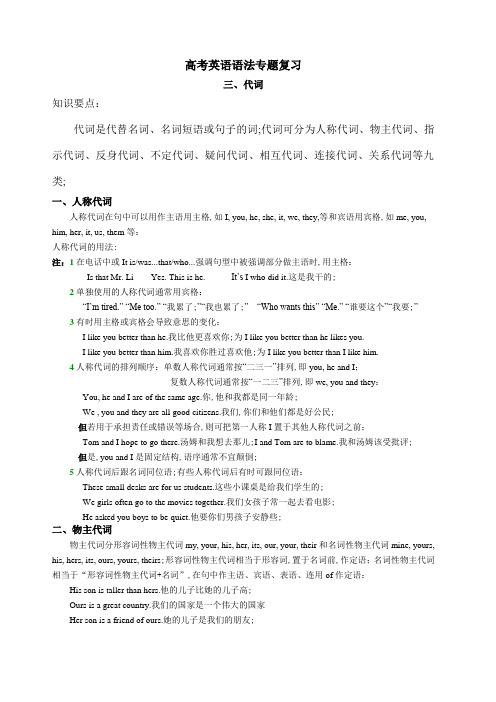
高考英语语法专题复习三、代词知识要点:代词是代替名词、名词短语或句子的词;代词可分为人称代词、物主代词、指示代词、反身代词、不定代词、疑问代词、相互代词、连接代词、关系代词等九类;一、人称代词人称代词在句中可以用作主语用主格,如I, you, he, she, it, we, they,等和宾语用宾格,如me, you, him, her, it, us, them等:人称代词的用法:注:1在电话中或It is/was...that/who...强调句型中被强调部分做主语时,用主格:---Is that Mr. Li ---Yes. This is he. It’s I who did it.这是我干的;2单独使用的人称代词通常用宾格:“I’m tired.” “Me too.” “我累了;”“我也累了;”“Who wants this” “Me.” “谁要这个”“我要;”3有时用主格或宾格会导致意思的变化:I like you better than he.我比他更喜欢你;为I like you better than he likes you.I like you better than him.我喜欢你胜过喜欢他;为I like you better than I like him.4人称代词的排列顺序:单数人称代词通常按“二三一”排列,即you, he and I;复数人称代词通常按“一二三”排列,即we, you and they:You, he and I are of the same age.你,他和我都是同一年龄;We , you and they are all good citizens.我们,你们和他们都是好公民;但若用于承担责任或错误等场合,则可把第一人称I置于其他人称代词之前:Tom and I hope to go there.汤姆和我想去那儿;I and Tom are to blame.我和汤姆该受批评;但是,you and I是固定结构,语序通常不宜颠倒;5人称代词后跟名词同位语;有些人称代词后有时可跟同位语:These small desks are for us students.这些小课桌是给我们学生的;We girls often go to the movies together.我们女孩子常一起去看电影;He asked you boys to be quiet.他要你们男孩子安静些;二、物主代词物主代词分形容词性物主代词my, your, his, her, its, our, your, their和名词性物主代词mine, yours, his, hers, its, ours, yours, theirs;形容词性物主代词相当于形容词,置于名词前,作定语;名词性物主代词相当于“形容词性物主代词+名词”,在句中作主语、宾语、表语、连用of作定语:His son is taller than hers.他的儿子比她的儿子高;Ours is a great country.我们的国家是一个伟大的国家Her son is a friend of ours.她的儿子是我们的朋友;This is your pen. Mine is in the box.这是你的铅笔,我的在铅笔盒里;注:1 a friend of mine ours, yours, hers, his, theirs结构2 物主代词与own连用;表强调;也可用of one’s own置于名词后作定语:Mind your own business.别管闲事;I saw it with my own eyes.那是我亲眼看到的;I hope to have a room of my own. / I hope to have my own house.我希望有自己的房子;三、指示代词指示代词是用来指代或标记人或事物的代词,表示“这个,这些”“那个,那些”;在句中可作主语、宾语、表语、定语;单数:this, that;复数:these, those;为了方便学习将such,so也归于此类;I like these and he likes those.我喜欢这些,他喜欢那些;What I want to say is this.我想说的就是这点;注:1 指示代词用作主语和定语时,可指人或物;用作宾语和表语时,只指物;如:This is my father. 作主语,指人Do you know this作宾语,指物,译为“你知道这个情况吗2 刚提到的或已经完成的事情时用that,但是若要指下文将要发生或将要提到的事情通常用this:She married Jim, and that surprised me.她嫁给了吉姆,这使我感到很吃惊;I want to know this: Is he healthy我想知道这一点:他是否很健康;3 在打电话时,通常用this指自己,用that指对方:Hello. This is Jim. Is that John喂,我是吉姆,你是约翰吗4 such指代前面所述的这样的人或事;如:Such is Albert Einstein, a famous physicist, but a simple man. 这就是艾尔伯特,爱因斯坦,......5 so代替一个句子或短语表达的事情;a.在believe,expect,suppose,imagine,think等词后用so代替前文观点;表肯定、否定=not均可;b. 用于表示肯定的hope,I’m afraid后,代替前文提出的观点;四、反身代词反身代词是oneself根据所指词的人称、性别、单复数等变化的词单数:myself, yourself,himself, herself, itself, 复数:ourselves, yourselves, themselves,在句中可作宾语、表语、同位语,不能作主语; 注:1用作同位语加强被修饰词的语气,紧放在被修饰名词后,或句末:The box itself is not so heavy.箱子本身并不重;You yourself said so. / You said so yourself.你自己是这样说的;2用作宾语动词或for,of, in, by, to等介词的宾语:She could not make herself understood.她不能使别人听懂她的话;You’ll have to see if he has come for yourself. for one self 亲自,为自己The computer may shut off of itself. of oneself 自动的You shouldn’t leave the child at home by herself. b y oneself 独自,单独Jim isn’t bad in himself, but he likes playing tricks on others. in one self 本身He likes a table to himself. to oneself 独自占用3 用作表语:有时用于be, feel, seem, look等后作表语表示身体或精神处于正常状态:The poor boy was myself.那个可怜的孩子就是我自己;The ones who really want it are ourselves.真正想要它的是我们自己;I'm not quite myself these days.我近来身体不大舒服;I'll be myself again in no time.我过一会儿就会好的;4 含有反身代词的动词短语:devote oneself to=be devoted to 专心于;lose oneself=be lost in 迷失;seat oneself= be seated 坐下; express oneself 表达某人的思想; say for oneself 为自己找借口;say to oneself 心想; talkto oneself 自言自语; feel oneself 觉得正常; come to oneself 苏醒;五、疑问代词疑问代词包括who, whom, whose,which, what,在句中可用作主语、表语、宾语、定语等:1、who与whom的用法:前者为主格,用作主语、宾语,后者为宾格,用作宾语;Who spoke at the meeting Whom are you talking about口语中或作宾语的whom位于句首时,通常可用who代替,但whom前有介词时除外:Whom is the letter from2、whose的用法:表示“谁的”,既可用于名词前作定语,也可单独使用;在句中作主、宾、表、定语;Whose is better, yours or hers作主语Whose do you love better, yours or hers作宾语Tom has already taken his bag is this作表语Whose bag do you like作定语3、what和which的用法:有选择范围时,多用which;无选择范围或不明确时,多用what;拓展:what的习惯用法:1 What...for... 和What for 用于询问原因和目的;---What did you put it into the soup for --- It would improve the taste.你为什么...---I’m going to the grocery store. ---What for We still have enough food in the apartment.为何啊(2)What if...表示假设、建议、征求意见或疑虑;What if it rains while we are on the way(3)What do you mean by...表示愤怒、不满等情绪;What do you mean by shutting the door so loudly(4)What/How about...用于征求对方意见、询问对方的情况;(5)疑问词what构成的固定搭配;So what那又怎么样呢表示不感兴趣或认为不重要What next店员用语还要什么Guess what你猜怎么着用于引起他人的注意What can I do for you你要买借什么4、what和who的区别:一般来说;what问职业、地位等,who问姓名或关系等:Who is he他是谁What is he他是干什么的六、相互代词相互代词只有each other和one another,它们在句中通常只用作宾语:We should help each other.我们应该互相帮助;They respect one another.他们互相尊重对方;The sea and the sky seem to melt into each other.大海和蓝天似乎融为一体;注:1相互代词在句中通常只用作宾语,不可作主语,所以以相互代词为宾语的句子不能变为被动语态;2不要将相互代词误认为是副词,将其用作状语,如可说talk to each other,但不能说talk each other;3相互代词可以有所有格形式:The students borrowed each other's notes.学生们互相借笔记;4有时可分开用:We each know what the other thinks.我们都知道对方的想法;七、不定代词1.不定代词概说;英语的不定代词有all, each, both, either, neither, one, none, little, few, many, much, other, another, some, any, no,few,little, both, enough, every等,以及由some, any, no和every构成的合成代词即somebody, anyone, nothing等;在这些不定代词中,多数都能作主语、宾语、表语或定语,但是代词none以及由some, any, no和every构成的合成代词只能作主语、宾语或表语,不能作定语,而no和every则只用作定语;2.指两者和三者的不定代词;有些不定代词用于指两者如both, either, neither,有的不定代词用于指三者如all, any, none, every,注意不要弄混:Both of my parents are doctors.我的父母都是医生;All of the students are interested in it.所有的学生对此都很感兴趣;There are trees on any side of the square.广场的每一边都种有树;He has two sons, neither of whom is rich.他有两个儿子,都不富有;He has three sons, none of whom is rich.他有三个儿子,都不富有;注:each可用于两者、三者或三者以上,而every只用于三者或三者以上,因此用于两者时只能用each,不能用every;如不能说There are trees on every side of the road.3.复合不定代词的用法特点;复合不定代词包括something, somebody, someone, anything, anybody, anyone, nothing, nobody, no one, everything, everybody, everyone等;它们在句中可用作主语、宾语或表语,但不能用作定语;something, someone等和anything, anyone等的区别与some和any的区别一样,前者一般用于肯定句,后者一般用于否定句、疑问句或条件句参见any & some;具体使用时应注意以下几点:1复合不定代词受定语修饰时,定语应放在它们后面:There is nothing wrong with the radio.这收音机没有毛病;Have you seen anyone anybody famous你见过名人吗2指人的复合不定代词若用作主语,其谓语动词一般用单数,相应的人称代词和物主代词也用单数he, him, his 不一定指男性;但在非正式文体中常用复数代词they, them, their:Everyone knows this, doesn't he don't they人人都知道这一点,不是吗If anybody anyone comes, ask him them to wait.要是有人来,让他等着;3指事物的复合不定代词若用作主语,谓语动词只能用单数,相应的人称代词也只能用it,而不用they:Everything is ready, isn't it一切都准备好了,是吗4anyone, everyone等只能指人,不能指物,且其后一般不接of短语;若是指物或后接of短语,可用any one, every one 分开写:any one of the boys books孩子们书当中的任何一个本every one of the students schools每一个学生一所学校4.是any not还是not any;按英语习惯,any以及含有any的复合不定代词用于否定句时,它只能出现在否定词之后,而不能在否定词之前:误:Any one doesn't know how to do it.正:No one knows how to do it.任何人都不知道如何做它;误:Anybody Anyone cannot do it.正:Nobody No one can do it.这事谁也干不了;误:Anything cannot prevent me from going.正:Nothing can prevent me from going.什么也不能阻挡我去;5.不定代词与部分否定;不定代词all, both, every等与not连用时构成部分否定;若要表示完全否定,则需换用none, neither, no one等;比较:All of the students like the novel.所有这些学生都喜欢这本小说;Not all of the students like the novel.并不是所有这些学生都喜欢这本小说;All of the students don’t like the novel.并不是所有这些学生都喜欢这本小说;None of the students like the novel.这些学生当中没有一个喜欢这本小说;6.all, both, each等用作同位语;若用作主语同位语,主语可以是名词或代词;若用作宾语等其他成分的同位语,则宾语等成分必须是人称代词,而不能是名词:We have all read it.我们都读过他;all修饰的主语是代词The villages have all been destroyed.村庄都被毁了;all修饰的主语是名词They told us all to wait there.他叫我们都在那儿等;all修饰的宾语是代词但不能说:They told the men all to wait there. all修饰的宾语是名词不是代词7.so little与such little的区别;用so little还是such little取决于little的意思:若表示数量方面的“少”,则用so little;若表示形状体积的“小”,则用such little:He has so little time for reading.他读书的时间少得可怜;I've never seen such little boxes.我从未见过那样小的盒子;8.some与any的用法区别;一般说来,some用于肯定句中,any用于否定句和疑问句中;但是,在表示请求、邀请或征求意见的句子中,通常要用some而不用any:Would you like some cake吃点蛋糕吗Why not buy some bread为什么不买些面包呢Shall I get some chalk for you要我帮你拿些粉笔来吗注:any有时也用于肯定句中,此时表示“任何”:Any colour will do.任何颜色都行;Come any day you like.随便哪天来都可以;9.many与much的用法区别;两者都表示“许多”,但many修饰或代替可数名词复数,与few少数相对;而much用来修饰或代替不可数名词单数,与little少量相对;在口语中两者主要用于非肯定句中:Did you see many people there你在那儿看见许多人了吗We don't have much time.我们没有许多时间;在肯定句中,一般用a lot of, lots of, plenty of等代之;但在正式文体中有时也用于肯定句中;另外,若用作主语或主语的定语,或其前有how, too, as, so, a good, a great等修饰,也可用于肯定句中:Many of us left early.我们有许多人离开得很早;Much work has been done.许多工作都已经做了;You've given me too much.你已给我太多了;Take as many much as you want.你要多少拿多少;I asked her a great many questions.我问了她许多问题;10.few, a few与little, a little的用法区别;1few和a few后接可数名词的复数形式;few表示数量很少或几乎没有,强调“少”,含有否定意义;a few表示数量虽然少但毕竟还有,强调“有”,含有肯定意义:It is very difficult, and few people understand it.它很难,没有几个人能懂;It is very difficult, but a few people understand it.他虽难,但是有些人懂;2little和a little之后接不可数名词,其区别跟few和a few之间的区别相似:Unfortunately, I had little money on me.很不巧,我身上没带什么钱;Fortunately, I had a little money on me.幸好我身上带着一点钱;11.other, the other, another与others的用法区别:这些不定代词不仅在含义上有单复数之分,而且在用法上有泛指无the和特指有the之别;其用法区别可归纳如下:1指单数时,若泛指用another,若特指用the other:Give me another one.另外给我一个;Shut the other eye, please.请把另一只眼睛也闭上;2指复数时,若泛指用other后接复数名词,若特指用the other后接复数名词:There are other ways of doing it.做这事还有其他的办法;Where have the other students gone其他学生都到哪里去了3others永远表示复数意义且其后不能再接名词;其用法大致相当于“other+复数名词”,同样地the others大致相当于“the other+复数名词”:Other people Others may not think that way.别的人可能不这样想;He is cleverer than the others the other students in her class.他比班上其他学生聪明;4another一般只能表单数,且其后接名词也只能接单数名词;但是若其后有数词或few修饰时,则也可接复数名词:We need another few chairs.我们还需要几把椅子;In another two weeks it'll be finished.再过两个星期就可做完了;5与some对比使用时,用others此时与some同义:Some say yes, and others say no.有人说对,有人说不对;12.不定代词与语境考题;不定代词是高考的常考考点,有的不定代词考题出得比较灵活,不能死套规则,要注意结合语境来理解:1“Is ____ here” “No, Bob and Tim have asked for leave.”A. anybodyB. everybodyC. somebodyD. nobody若只是从表面来看,填空句是个疑问句,可能会误选A;但其实此题最佳答案应选B,因为下文的答句说“只有Bob和Tim请假了”,这说明问句是在查人数,故用Is everybody here 大家都到齐了吗2I agree with most of what you said, but I don't agree with _____.A. everythingB. anythingC. somethingD. nothing此句若从表面看,有可能误选B,因为填空句为否定句;但实际上最佳答案为A,因为上文说“我同意他说的大部分内容”,这与下文的but I don’t agree with everything但并不是同意他说的所有内容完全相符;3“Do you have _____ at home now, Mary” “No, we still have to get some fruit and tea.”A. somethingB. anythingC. everythingD. nothing答案选C,句意为“玛丽,现在家里东西都准备齐了吗”“还没有,我们还要买些水果和茶;”4“If you want a necklace, I’ll buy one for you at once.” “Oh, no. A necklace is not _____ that I need most. A. anythingB. somethingC. nothingD. everything此题容易误选A,机械地认为:something用于肯定句,anything用于否定句或疑问句;但是,此题的最佳答案是B,something在此的意思不是“某种东西”,而是指“那种东西”或“这种东西”,即心中最想要的那种东西相当于the thing;。
高考英语语法专题复习 :专题10 代词(代词知识点整理总结)

高考英语语法专项复习代词知识点整理总结距离高考还有一段时间,不少有经验的老师都会提醒考生,愈是临近高考,能否咬紧牙关、学会自我调节,态度是否主动积极,安排是否科学合理,能不能保持良好的心态、以饱满的情绪迎接挑战,其效果往往大不一样。
以下是本人从事10多年教学经验总结出的以下学习资料,希望可以帮助大家提高答题的正确率,希望对你有所帮助,有志者事竟成!养成良好的答题习惯,是决定高考英语成败的决定性因素之一。
做题前,要认真阅读题目要求、题干和选项,并对答案内容作出合理预测;答题时,切忌跟着感觉走,最好按照题目序号来做,不会的或存在疑问的,要做好标记,要善于发现,找到题目的题眼所在,规范答题,书写工整;答题完毕时,要认真检查,查漏补缺,纠正错误。
总之,在最后的复习阶段,学生们不要加大练习量。
在这个时候,学生要尽快找到适合自己的答题方式,最重要的是以平常心去面对考试。
英语最后的复习要树立信心,考试的时候遇到难题要想“别人也难”,遇到容易的则要想“细心审题”。
越到最后,考生越要回归基础,单词最好再梳理一遍,这样有利于提高阅读理解的效率。
另附高考复习方法和考前30天冲刺复习方法。
一、代词的分类二、代词的用法考点一it, that, one(s), those的用法1.it代替的是前面提到的同一事物,即同名同物,所代替的名词可以是可数名词,也可以是不可数名词。
如:I’d like to look at that atlas. May I borrow it?我想看看那张地图,我能借用一下吗(it代替可数名词atlas)?2.one叫作泛指代词代替的是前面提到的同名异物中的任何一个,所代替名词是可数名词单数,其前可带冠词与修饰语。
如果代替复数名词,则用ones。
如:①The population problem may be the greatest one in the world today.人口问题可能是当今世界上最大的一个问题。
高考英语语法专攻-《代词》-考点归纳+针对性练习
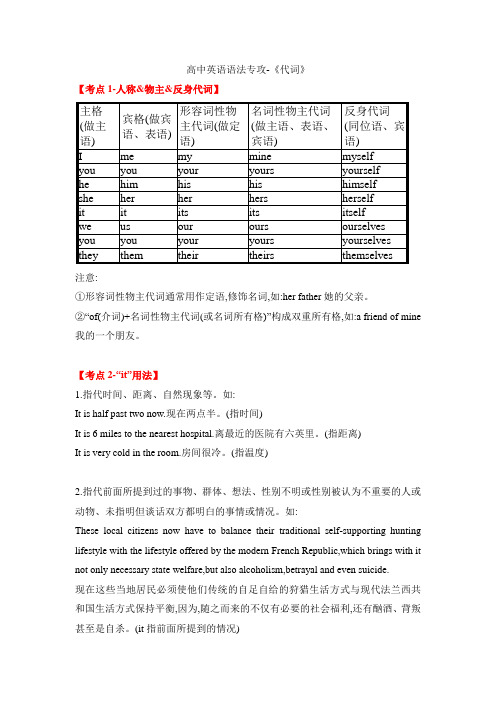
高中英语语法专攻-《代词》【考点1-人称&物主&反身代词】注意:①形容词性物主代词通常用作定语,修饰名词,如:her father她的父亲。
②“of(介词)+名词性物主代词(或名词所有格)”构成双重所有格,如:a friend of mine 我的一个朋友。
【考点2-“it”用法】1.指代时间、距离、自然现象等。
如:It is half past two now.现在两点半。
(指时间)It is 6 miles to the nearest hospital.离最近的医院有六英里。
(指距离)It is very cold in the room.房间很冷。
(指温度)2.指代前面所提到过的事物、群体、想法、性别不明或性别被认为不重要的人或动物、未指明但谈话双方都明白的事情或情况。
如:These local citizens now have to balance their traditional self-supporting hunting lifestyle with the lifestyle offered by the modern French Republic,which brings with it not only necessary state welfare,but also alcoholism,betrayal and even suicide.现在这些当地居民必须使他们传统的自足自给的狩猎生活方式与现代法兰西共和国生活方式保持平衡,因为,随之而来的不仅有必要的社会福利,还有酗酒、背叛甚至是自杀。
(it指前面所提到的情况)—Who’s that at the door?—It is the milkman.——门口那人是谁?——是送奶工。
(it指代性别不明或性别被认为不重要的人)—I’ve broken a plate.我打碎了一个盘子。
—It(=Breaking the plate) doesn’t matter.没关系。
2020年高考英语复习代词

2020年高考英语复习代词高考英语复习代词〇、三个问题1、WHY?代替名词、形容词pron. = pro noun2、WHAT?人称代词:我,你,她,他,它,我们,你们,他们物主代词:我的,你的,他的……指示代词:这个,那个;这些,那些反身代词:……自己不定代词:某个,某些,某些人,某些事儿,任何事,所有的……疑问代词:什么,哪个,谁的(what, which, whose)关系代词:(用在定语从句中)连接代词:(用在名词性从句中)相互代词:互相(each other, one another)3、HOW?一、人称代词1、单数/复数2、主格/宾格主格= 放在主语位置的格式宾格= 放在宾语位置的格式二、物主代词1、构成2、形容词性/名词性我的书包(我的=形容词性物主代词)这个书包是我的(我的=名词性物主代词)This is my dictionary. Where is yours?This is my book. = This is mine.Her dress is red. = Hers is red.3、双重所有格He is a friend of myfather's. He is a friend ofmine.4、小试牛刀1)She is a friend of .A.myB.mineC.I2)This isn’t my pen, it is .A.herB.hisC.him3)Frank can’t find dictionary. Can you lend t o ?A.her; mine; herB./; yours; heC.his; yours; him4)school is much bigger than .A.Our; theirB.Ours; theirsC.Our; theirs5)The dog is so poor because leg is badly hurt.A.itB.itsC. it’s三、反身代词(……自己)1、构成+self 复数:+selves2、用法①反射自身我自己去解答。
高考英语语法代词详解
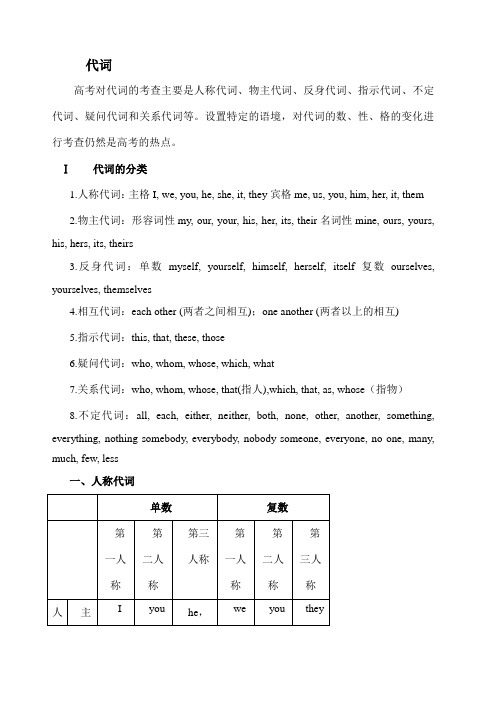
代词高考对代词的考查主要是人称代词、物主代词、反身代词、指示代词、不定代词、疑问代词和关系代词等。
设置特定的语境,对代词的数、性、格的变化进行考查仍然是高考的热点。
Ⅰ代词的分类1.人称代词:主格I, we, you, he, she, it, they宾格me, us, you, him, her, it, them2.物主代词:形容词性my, our, your, his, her, its, their名词性mine, ours, yours, his, hers, its, theirs3.反身代词:单数myself, yourself, himself, herself, itself复数ourselves, yourselves, themselves4.相互代词:each other (两者之间相互);one another (两者以上的相互)5.指示代词:this, that, these, those6.疑问代词:who, whom, whose, which, what7.关系代词:who, whom, whose, that(指人),which, that, as, whose (指物)8.不定代词:all, each, either, neither, both, none, other, another, something, everything, nothing somebody, everybody, nobody someone, everyone, no one, many, much, few, less一、人称代词单数复数第一人称第二人称第三人称第一人称第二人称第三人称人主I you he,we you they称代词格she,it宾格me you him,her,itus you them人称代词的用法1.人称代词的主格在句子中作主语或主语补足语。
如:John waited a while but eventually he went home.约翰等了一会儿,最后他回家了。
高考英语代词用法详解
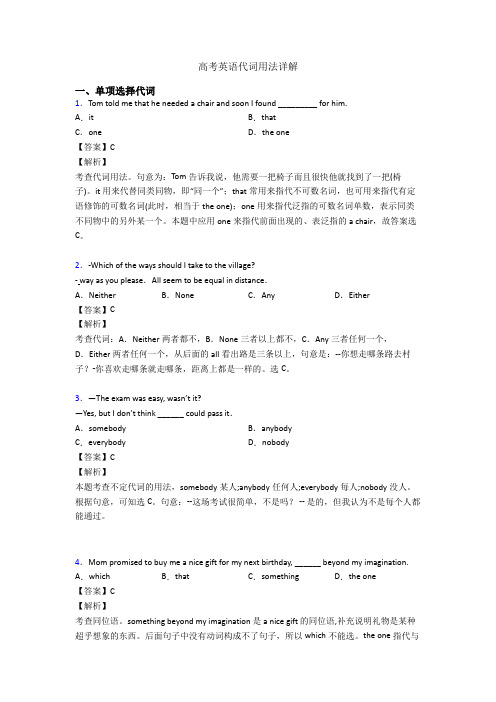
高考英语代词用法详解一、单项选择代词1.Tom told me that he needed a chair and soon I found _________ for him.A.it B.thatC.one D.the one【答案】C【解析】考查代词用法。
句意为:Tom告诉我说,他需要一把椅子而且很快他就找到了一把(椅子)。
it用来代替同类同物,即“同一个”;that常用来指代不可数名词,也可用来指代有定语修饰的可数名词(此时,相当于the one);one用来指代泛指的可数名词单数,表示同类不同物中的另外某一个。
本题中应用one来指代前面出现的、表泛指的a chair,故答案选C。
2.-Which of the ways should I take to the village?- way as you please.All seem to be equal in distance.A.Neither B.None C.Any D.Either【答案】C【解析】考查代词:A.Neither两者都不,B.None三者以上都不,C.Any三者任何一个,D.Either两者任何一个,从后面的all看出路是三条以上,句意是:--你想走哪条路去村子?-你喜欢走哪条就走哪条,距离上都是一样的。
选C。
3.—The exam was easy, wasn’t it?—Yes, but I don’t think ______ could pass it.A.somebody B.anybodyC.everybody D.nobody【答案】C【解析】本题考查不定代词的用法,somebody某人;anybody任何人;everybody每人;nobody没人。
根据句意,可知选C。
句意:--这场考试很简单,不是吗? -- 是的,但我认为不是每个人都能通过。
4.Mom promised to buy me a nice gift for my next birthday, ______ beyond my imagination. A.which B.that C.something D.the one【答案】C【解析】考查同位语。
高考复习代词

一、人称代词 人称代词有主格和宾格之分,主格在句中 作主语、表语等成分,宾格在句中作动词、 介词宾语、同位语等成分,有时也可作表 语。不仅指人,也可指物,有人称和数的 变化。
【注意】在连词than和as引导的比较状语从句 中常常省略从句,只保留人称代词,人称代 词作主语时要用主格,在口语中也常用宾格; 但当人称代词后有动词时就必须用主格。如: My sister speaks English as well as me/I. (口语 中常用me) My sister speaks English as well as I do. (此时 只能用I)
3. 名词性物主代词相当于“形容词性物主 代词+名词”,可单独作主语、宾语、表 语。此外,名词性物主代词还可与名词及 of连用,构成双重所有格。如: This is her coat. Mine is over there. Some friends of mine will attend my birthday party.
2. 反身代词可以作主语的同位语,主要起加强 语气的作用,意为“亲自,本人,亲身”。 e.g. The teacher and pupils mended the road themselves. 3. 反身代词可以在be, feel, look, seem等系动词 后作表语,表示身体或精神状态处于正常。 e.g. —You look pale. What’s wrong with you? —I’m not feeling myself today, not serious, though.
二、物主代词 1.物主代词分为形容词性物主代词和名词 性物主代词,必须与所指的名词在人称、 数和性别方面保持一致。如: The waiters offered their food to the homeless man. 【注意】单数阳性名词和单数阴性名词连 用作主语时,如果前面有every,each修饰, 谓语动词用单数,代词用his。如:
高考英语语法专项复习——代词

7) He doesn’t know how to express himself _____ in English. 8) With money in hand,the happy children went to buy ________ themselves some ice cream. 9) Mind you don’t hurt yourself ______with those scissors. 10)Life is not easy. One should enjoy oneself himself at times. _______/_______ 11) Listen! Someone has lockedthemselves _______ / ________ himself in the room. 12) “DIY” means “do it ________.” yourself
泛指 特指
单数 one (a+单数可数名词) the one=that (the+单数可数名词)
复数 ones (复数名词) the ones=those (the+复数名词)
注:口语中,特别是当后面有of短语时,多用that或 those;当有前置修饰语时,只能用one(s)。
His bag is newer than that of mine/me I like the red one.
6) Which one is right? Sometimes we teachers hardly know what you are thinking and doing. Sometimes our teachers hardly know what you are thinking and doing. 7) (07高考) …We thanked her for all the her trouble we had caused ____.
高考英语 代词
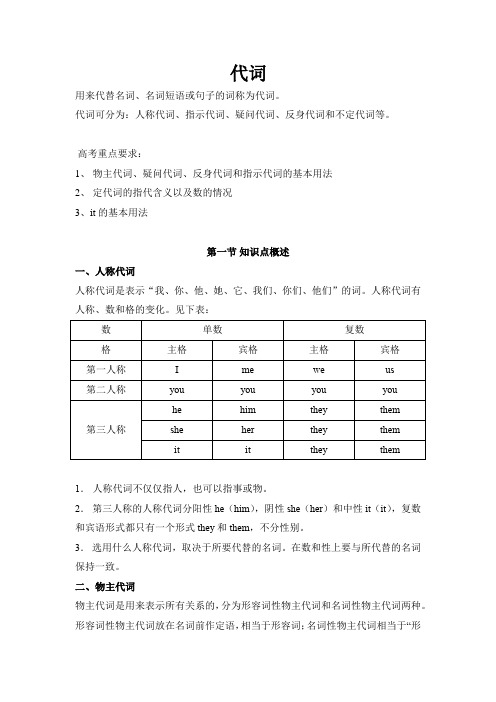
代词用来代替名词、名词短语或句子的词称为代词。
代词可分为:人称代词、指示代词、疑问代词、反身代词和不定代词等。
高考重点要求:1、物主代词、疑问代词、反身代词和指示代词的基本用法2、定代词的指代含义以及数的情况3、it的基本用法第一节知识点概述一、人称代词人称代词是表示“我、你、他、她、它、我们、你们、他们”的词。
人称代词有人称、数和格的变化。
见下表:1.人称代词不仅仅指人,也可以指事或物。
2.第三人称的人称代词分阳性he(him),阴性she(her)和中性it(it),复数和宾语形式都只有一个形式they和them,不分性别。
3.选用什么人称代词,取决于所要代替的名词。
在数和性上要与所代替的名词保持一致。
二、物主代词物主代词是用来表示所有关系的,分为形容词性物主代词和名词性物主代词两种。
形容词性物主代词放在名词前作定语,相当于形容词;名词性物主代词相当于“形容词性物主代词+名词”,相当于名词,可以作主语、表语或宾语。
物主代词的用法:(1)形容词性物主代词放在名词前作定语。
例如: His pencil box is on the desk.This is our school.(2)名词性物主代词作名词用,本身就相当于“形容词性物主代词+名词”,因此,后面不可再加名词。
作主语: Richard’s school bag is blue and mine is black. 理查德的书包是蓝色的,我的书包是黑色的。
(mine=my school bag)作表语: It’s his. 这是他的(东西)。
作宾语: He borrows your dictionary and you may borrow mine. 他借你的字典,你可以借我的。
(作及物动词的宾语)“of+名词性物主代词”可以放在名词后作定语,表示强调: He is a friend of mine. 他是我的一个朋友。
·注意:试比较下面两句句子:This is a photo of mine. 这是我的一张照片。
高考英语复习高中英语语法知识点总结代词
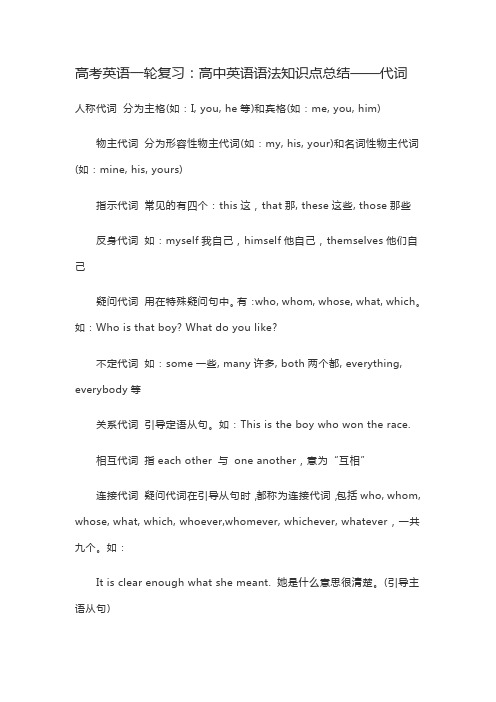
高考英语一轮复习:高中英语语法知识点总结——代词人称代词分为主格(如:I, you, he等)和宾格(如:me, you, him) 物主代词分为形容性物主代词(如:my, his, your)和名词性物主代词(如:mine, his, yours)指示代词常见的有四个:this这,that那, these这些, those那些反身代词如:myself我自己,himself他自己,themselves他们自己疑问代词用在特殊疑问句中。
有:who, whom, whose, what, which。
如:Who is that boy? What do you like?不定代词如:some一些, many许多, both两个都, everything, everybody等关系代词引导定语从句。
如:This is the boy who won the race.相互代词指each other 与one another,意为“互相”连接代词疑问代词在引导从句时,都称为连接代词,包括who, whom, whose, what, which, whoever,whomever, whichever, whatever,一共九个。
如:It is clear enough what she meant. 她是什么意思很清楚。
(引导主语从句)I don’t care what they think. 他们怎么想我不管。
(引导宾语从句)第1讲人称代词第2讲指示代词人称代词分为主格和宾格。
考点1. 代词作同位语如果代词和名词指代相同时,常用主格或宾格作同位语,不用物主代词。
改错:Our Chinese people are friendly.把our改为we, 因为我们本身就是中国人。
考点2. 用人称代词宾格代替主格的情况①口语中作表语的人称代词一般用宾格,不用主格。
—Who is it? —It’s me.②在比较句型中,as和than后的主格可以用宾格代替。
高考英语代词
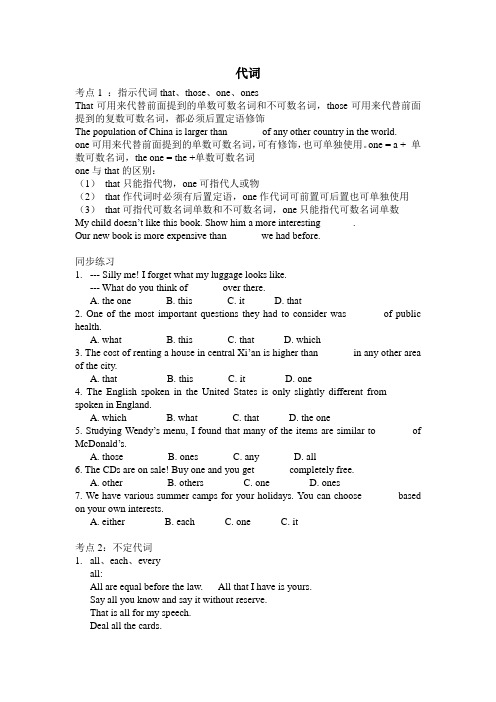
代词考点1 :指示代词that、those、one、onesThat可用来代替前面提到的单数可数名词和不可数名词,those可用来代替前面提到的复数可数名词,都必须后置定语修饰The population of China is larger than ______ of any other country in the world.one可用来代替前面提到的单数可数名词,可有修饰,也可单独使用。
one = a + 单数可数名词,the one = the +单数可数名词one与that的区别:(1)that只能指代物,one可指代人或物(2)that作代词时必须有后置定语,one作代词可前置可后置也可单独使用(3)that可指代可数名词单数和不可数名词,one只能指代可数名词单数My child doesn’t like this book. Show him a more interesting ______.Our new book is more expensive than ______ we had before.同步练习1.--- Silly me! I forget what my luggage looks like.--- What do you think of ______ over there.A. the oneB. thisC. itD. that2. One of the most important questions they had to consider was ______ of public health.A. whatB. thisC. thatD. which3. The cost of renting a house in central Xi’an is higher than ______ in any other area of the city.A. thatB. thisC. itD. one4. The English spoken in the United States is only slightly different from ______ spoken in England.A. whichB. whatC. thatD. the one5. Studying Wendy’s menu, I found that many of the items are similar to ______ of McDonald’s.A. thoseB. onesC. anyD. all6. The CDs are on sale! Buy one and you get ______ completely free.A. otherB. othersC. oneD. ones7. We have various summer camps for your holidays. You can choose ______ based on your own interests.A. eitherB. eachC. one C. it考点2:不定代词1.all、each、everyall:All are equal before the law. All that I have is yours.Say all you know and say it without reserve.That is all for my speech.Deal all the cards.There is justice for us all.each:Each has a cup of tea.Give an apple to each.There is a line of trees on each side of the road.Give them each an apple.Each of his children goes to a different school.every:Every student has a dictionary.2.no one、nothing、none(1)no one = nobody只能指人,不能与介词of连用,谓语动词用单数No one likes a person with bad manners.(2)nothing指物,谓语动词用单数,可与of连用The box contained nothing.Think nothing of it.(3)none既可指人也可指物,经常和of连用,谓语动词单复数皆可None of books are easy enough for us.None of us has got a camera.3.both、neither、either同步练习:1.To know more about the British Museum, you can use the Internet or go to thelibrary, or ______.A. neitherB. someC. allD. both2. He had lost his temper and his health in the war and never found ______ of them again,A. neitherB. eitherC. eachD. all3. Larry asks Bill and Peter to go on a picnic with him, but ______ of them wants to, because they have work to do.A. eitherB. anyC. neitherD. none4. It was hard for him to learn English in a family, in which ______ of the parents spoke the language.A. noneB. neitherC. bothD. each5. --- John, when shall we meet again, Thursday or Friday?--- ______. I’ll be off to London then.A. EitherB. NeitherC. BothD. None6. --- Do you want tea or coffee?--- ______. I really don’t mind.A. NoneB. NeitherC. EitherD. All7. --- Would you like tea or coffee?--- ______, thank you. I’ve just had some water.A. EitherB. BothC. AnyD. Neither4.many、much及类似词汇(1)只修饰可数名词:many,many a,a few,several,a(great、large)amountof,amounts of(2)只修饰不可数名词:much,a little,little,a bit of,a good/great deal of,a great/large amount of,amounts of(3)修饰两者均可:some/any,a lot of,lots of,plenty of,a great/large quantityof,quantities of同步练习1.The two girls are getting on very well and share ______ with each other.A. littleB. muchC. someD. none2. He doesn’t have _____ furniture in his room --- just an old desk.A. anyB. manyC. someD. much3. When Mom looked back on the early days of their marriage, she wondered how they had managed with ______ money.A. so fewB. such fewC. so littleD. much little5.other、another、others同步练习1.I’ll spend half of my holiday practicing English and ______ half learning drawing.A. anotherB. the otherC. othersD. other2. You are a team star! Working with ______ is really your cup of tea.A. bothB. eitherC. othersD. the other3. I felt so bad all day yesterday that I decided this morning I couldn’t face ______ day like that.A. otherB. anotherC. the otherD. others4. --- Could we see each other at 3 o’clock this afternoon?--- Sorry. Let’s make it ______ time.A. other’sB. otherC. anotherD. other5. To stay awake, he finished a cup of coffee and ordered ______.A. the otherB. otherC. the othersD. another考点3:反身代词I cut myself when shaving this morning.I am not quite myself these days.I will be myself again in no time.They themselves are to blame.We had better ask the doctor himself.其它练习1. ______ that’s important is that you are doing your best and moving in the right direction.A. OneB. AllC. EverythingD. Anything2. I know that ______ would discourage him; he would never give up to be a director.A. somethingB. anythingC. everythingD. nothing3. Charles was alone at home, with ______ looking after him.A. someoneB. anyoneC. not oneD. no one4. Sophia waited for a reply, but ______ came.A. eitherB. anotherC. neitherD. none5. When you introduce me to Mr. Johnson, could you please say ______ for me?A. everythingB. anythingC. somethingD. nothing6. When was ______ that you saw her last?A. thatB. thisC. itD. there7. There is no greater love than ______ who lays down his life for his country.A. that of a manB. a manC. that of a man’sD. a man’s love8. --- Would you like to buy a bike of this kind?--- Yes, I’d like to have ______.A. itB. oneC. thisD. that9. I saw no more than one clock in that shop. Will you go and buy ______?A. anyB. itC. someD. one10. The children ______ a small computer.A. each hasB. has eachC. each haveD. any11. The United States of America is much bigger than ______ country in Africa.A. all theB. all the otherC. any otherD. any12. --- Who did you find in the room?--- ______.A. NoneB. NotC. NoD. Nobody13. ______ houses and buildings were destroyed in the earthquake.A. Such manyB. Too muchC. A great many ofD. A great number of14. If your parents do everything for us children, we won’t learn to depend on ______.A. themselvesB. themC. usD. ourselves。
2024新高考英语复习(代词)

3.作表语 The winning numbers are those. 获奖号码是那些。 4.作宾语 I have no doubt about that. 我对那件事没有怀疑。
二、指示代词的用法 1.this,these往往指在时间或空间上较近的人或物;that,those可指在时间或 空间上较远的人或物。 例句
This picture was painted by Robert and that one by Bruce. 这幅画是罗伯特画的,那幅是布鲁斯画的。 I love these books but I don't like those(ones).我喜欢这些书,但不喜欢那 些。
2.that与those常用来代替上文已提到的名词,以避免重复。 例句 The climate of China is quite similar to that of the USA. 中国的气候和美国的气候很相似。 The days in summer are longer than those in winter.夏天的白天比冬天的白 天长。 3.打电话时,this指自己,that指别人。 例句 Hello! This is Alan. Who is that speaking? 喂!我是艾伦。您是哪位?
一、one/ones,the one/the ones作替代词时的用法 1.one:替代“a/an+单数可数名词” Mr. Rod prefers a restaurant in a small town to one in so large a city as Beijing. 与像北京这样大的城市里的饭店相比,Rod先生更喜欢小镇上的饭店。 2.ones:替代“零冠词+复数名词” Mr. Zhang gave me many valuable presents,ones that I had never seen.张先 生给了我很多珍贵的礼物,都是我从没见过的。
高考语法代词总结(人称+物主+反身+疑问)
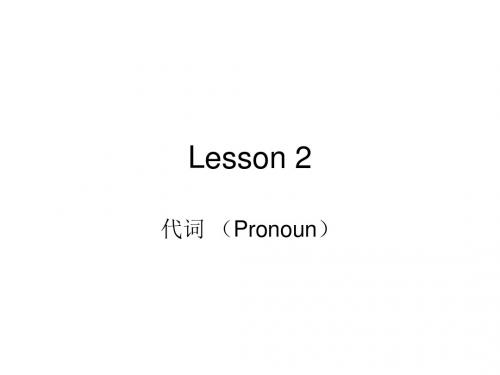
三:反身代词的用法
My self, Himself……..
三.反身代词 2. 反身代词常见固定搭配 enjoy oneself ① 过得愉快 teach / learn oneself sth. ②自学 ③ 请随便吃… help oneself to sth. say to oneself ④ 自言自语 by oneself ⑤ 独自 for oneself ⑥ 为自己 make oneself at home ⑦ 不要客气 ⑧ 陶醉/沉浸于 lose oneself in… ⑨ 自己穿衣服 dress oneself look after oneself ⑩ 照顾自己
三 her
hers
复 We
一 us our
ours
复 you
二 your your
yours
复 They
三 them their
theirs
三 it its
its
him her
your his
yours his
反身 代词 疑问 代词
指示 代词
Байду номын сангаас
myself
yourself
himself herself
(4):固定用法 it is said that..
It is said that all of them have gone to the cinema. (据说。。)
1. --- Who is knocking at the door? --- I don’t know . I was lying in the bed and just ask who ____ was. A. he B. she C. it
IT 专题(it 用法)
代词(人称代词物主代词反身代词)课件-高考英语一轮复习
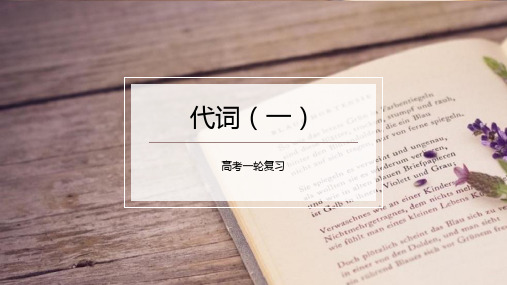
02 物 主 代 词
02 物主代词 物主代词是表示所有关系的代词,是人称代词的属格形式。它的分类如下表所示:
02 形容词性物主代词
名词性物主代词的特殊用法
①“of+名词性物主代词”可用作定语,常用于“a/an/this/that/these/those/some/any/several /no /each/ every/such/another/which+名词+ of+名词性物主代词”结构中。(双重所有格)
03 反 身 代 词
03 反身代词
反身代词使施动者把动作在形式上反射到施动者自己,即表示“我(们)自己、 你(们)自己、他/她/它(们)自己的代词。因此,反身代词与它所指代的名词 或代词形成互指关系,在人称、性、数上保持一致。强调“亲自、本人”。
数 人称 第一人称
第二人称
第三人称
单数 myself yourself himself/ herself/ itself
I am an admirer of yours. This baby of hers is so lovely! This is a photo of me. (照片上的人是我) This is a photo of mine (强调照片归我所有)
② yours 用于书信中,在给陌生人的书信的最后加上yours faithfully/ truly/ sincerely; 在给 熟悉的人或朋友的书信最后直接用yours ever 或yours.
高考代词考点及用法总结

高考代词考点及用法总结【考纲解读】在句中用来代替名词、名词短语或句子的词称为代词。
代词可以在句子中作主语、宾语、表语或定语等。
近3年来,高考重点考查不定代词,所考题量占所考代词总量的50%左右,其次是it的用法和替代词。
试题的设计注重语境设置,要求考生将句子意思和句子结构联系起来选出正确的代词。
因此,做题时要在熟练掌握各类代词基本用法的基础上,特别注意句意和句子结构的结合,只靠死背语法是很难奏效的。
【重点知识梳理】一:both,all,either,each,every,neither,none的用法1.both,either,neither用于两者。
both意为“两者都”;either意为“两者中的任何一个”;neither意为“两者中的任何一个都不”。
如:Both the boys are clever.两个男孩每个都很聪明。
Either of the two boys is clever.两个男孩都很聪明。
Neither of the two boys is clever.两个男孩都不聪明。
2.all,none,each,every用于多者。
all意为“全部都”,指可数的东西时为复数,指不可数的东西时为单数;none意为“全都不,任何一个都不”,指可数的东西时可为单数或复数,指不可数的东西时为单数;each和every意为“每一个”,为单数,两者都能作定语用,但each还可作主语、宾语和同位语。
All of the students are there.All(of)the milk is there.Every student in our school works hard.我们学校的学生都很用功。
Each student may have an edictionary./Each of the students has an edictionary./The students each have an edictionary.每个学生都可有一本电子词典。
英语(高考总复习代词)-10月31日
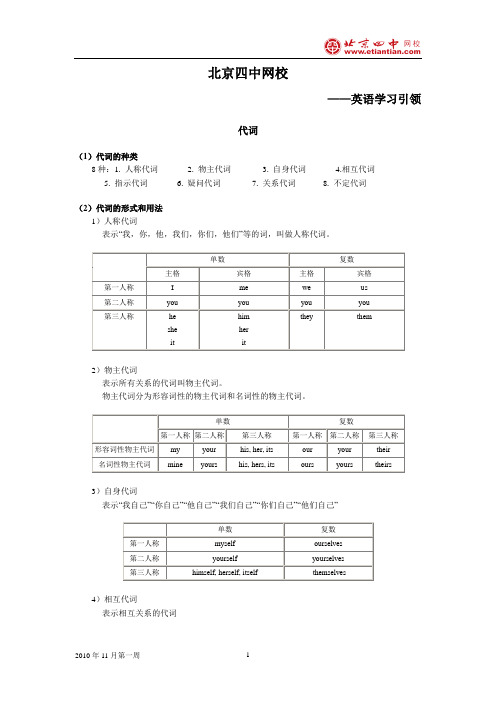
北京四中网校——英语学习引领代词(1)代词的种类8种:1. 人称代词 2. 物主代词 3. 自身代词 4.相互代词5. 指示代词6. 疑问代词7. 关系代词8. 不定代词(2)代词的形式和用法1)人称代词表示“我,你,他,我们,你们,他们”等的词,叫做人称代词。
2)物主代词表示所有关系的代词叫物主代词。
物主代词分为形容词性的物主代词和名词性的物主代词。
3)自身代词表示“我自己”“你自己”“他自己”“我们自己”“你们自己”“他们自己”4)相互代词表示相互关系的代词5)指示代词表示“这个”“那个”“这些”“那些”等指示概念的代词叫做指示代词。
指示代词有this, that, these, those等。
A. this (these) 一般用来指时间或空间上较近的事物和人,that (those) 指时间或空间较远的事物和人。
This is a tractor and that is a car.They are busy with harvesting these days.In those days the Chinese women were looked down upon, and suffered very much.B. that (those) 指前面讲到过的事物,this, these指下面要讲的事物。
He was ill. That's why he didn't come.This is what you must do.C. 为了避免重复,可用that或those代替前面提到的事物。
The weather of Beijing is as good as that of Qingdao.D. this和that 可以在口语中作状语Can hard work change a person that much.6)疑问代词疑问代词有who, whom, whose, what和which.A. 疑问代词 who, whom, whose, what和which 来构成特殊疑问句。
高考英语复习语法知识专题讲解3---代词(解析版)
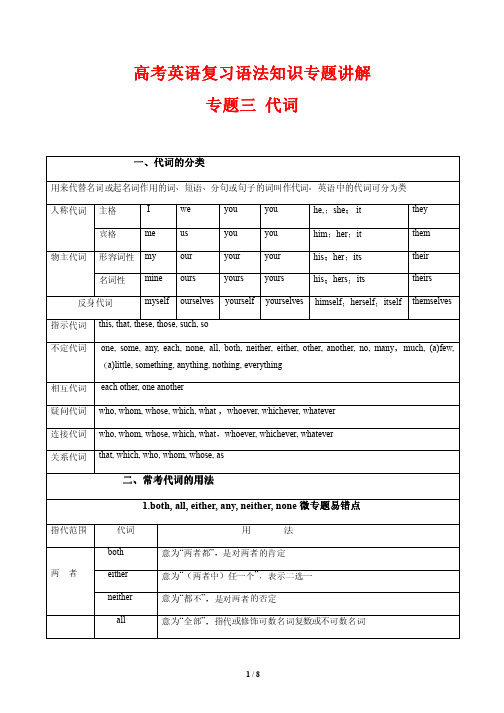
高考英语复习语法知识专题讲解专题三代词一、代词的分类用来代替名词或起名词作用的词、短语、分句或句子的词叫作代词。
英语中的代词可分为类人称代词主格 I we you you he,;she; it they 宾格me us you you him;her;it them物主代词形容词性my our your your his;her;its their 名词性mine ours yours yours his;hers;its theirs 反身代词myself ourselves yourself yourselves himself;herself;itself themselves 指示代词this, that, these, those, such, so不定代词 one, some, any, each, none, all, both, neither, either, other, another, no, many,much, (a)few,(a)little, something, anything, nothing, everything相互代词 each other, one another疑问代词who, whom, whose, which, what ,whoever, whichever, whatever连接代词who, whom, whose, which, what,whoever, whichever, whatever关系代词that, which, who, whom, whose, as二、常考代词的用法1.both, all, either, any, neither, none 微专题易错点指代范围代词用法两者both 意为“两者都”,是对两者的肯定either 意为“(两者中)任一个”,表示二选一neither 意为“都不”,是对两者的否定all 意为“全部”,指代或修饰可数名词复数或不可数名词三者或三者以上any 意为“任何一个”,指代或修饰可数名词单数或不可数名词none意为“全无,没有一点”,指代可数名词复数或不可数名词指物或人,其后可接表示范围的of...回答 how many/how much 的提问no one意为“没有人”,只指人其后不接表示范围的of...回答 who 的提问例:He is good at both English and French.You can take either of the pictures, whichever you like.It was a game in which neither team would win.Neither of us could understand German.All are happy to know the news.Phone me any day next week.We had three cats once but none(of them)is alive now.No one knows the answer.-How many of you have been to the Great Wall?-None.2.other, another 微专题易错点两者都意为“另一个”。
- 1、下载文档前请自行甄别文档内容的完整性,平台不提供额外的编辑、内容补充、找答案等附加服务。
- 2、"仅部分预览"的文档,不可在线预览部分如存在完整性等问题,可反馈申请退款(可完整预览的文档不适用该条件!)。
- 3、如文档侵犯您的权益,请联系客服反馈,我们会尽快为您处理(人工客服工作时间:9:00-18:30)。
2. 反身代词可以作主语的同位语,主要起加强 语气的作用,意为“亲自,本人,亲身”。 e.g. The teacher and pupils mended the road themselves. 3. 反身代词可以在be, feel, look, seem等系动词 后作表语,表示身体或精神状态处于正常。 e.g. —You look pale. What’s wrong with you? —I’m not feeling myself today, not serious, though.
all, both, either, other, another, one, each, many, much, (a) few, (a) little, some, any, none, no one…
相互 宾格 each other, one another 代词 所有格 each other’s, one another’s
二、物主代词 1.物主代词分为形容词性物主代词和名词 性物主代词,必须与所指的名词在人称、 数和性别方面保持一致。如: The waiters offered their food to the homeless man. 【注意】单数阳性名词和单数阴性名词连 用作主语时,如果前面有every,each修饰, 谓语动词用单数,代词用his。如:
【考例】It’s an either-or situation — we can buy a new car this year or we can go on holiday but we can’t do _____. D (2013新课 标全国卷II) A. others B. either C. another D. both
4. 反身代词的习惯搭配
(1) 介词+反身代词
for oneself 为自己;亲自地
to oneself
对自己;独用
of oneself 自动地
by oneself 独自地
(2) 动词+反身代词 dress oneself 自己穿衣 make oneself at home 不要客气 seat oneself=be seated 就坐 teach oneself 自学 come to oneself 苏醒 devote oneself to = be devoted to 致力于 enjoy oneself 过得愉快,玩得高兴 help oneself to 自行取用,请自便
We said hello to one another’s/each other’s family. 三、疑问代词 1. 疑问代词后接ever的用法。 (1) whatever/whoever/whomever/whichever 表泛指,意为“无论……”。如: You have our support, whatever you decide. Whichever of you gets here first will get the prize. I don’t want to see them, whoever they are.
注意(1)反身代词本身不能单独作主语。 (正) I myself drove the car. 我自己开车。 (误) Myself drove the car. (2) 在由and, or, nor连接的并列主语中,第 二个主语可用反身代词,特别是myself 作主语。 e.g. Charles and myself saw it. (3) 在不强调的情况下,but, except, for等介 词后宾语用反身代词或人称代词均可。 e.g. No one but myself/me is hurt.
二、全部否定与部分否定 由some和any构成的不定代词的用法与some和 any的用法基本一致。all, both, everyone, everybody, everything以及“every+名词”都 表示全部肯定;no one, none, nobody, nothing, not...any以及“no+名词”都表示全部否定; 但当not出现在含有全部肯定的不定代词的句子 中,不管not在它们之前还是在它们之后都表示 部分否定。此外not与总括性副词如everywhere, always, wholly, altogether等连用时也表示部分 否定。
these, those
what, which, who, whom, whose
关系代词
连接代词
that, which, who, whose, as
who, whom, whose, which, what, whoever, whomever, whichever, whatever
不定 代词 复合不 someone, anyone, something, 定代词 anything, nothing, everything, everyone, nobody…
一、指示代词 1. 指上文提到的事物,一般用that,有时也 用this;指下文将要提到的事物,常用this 或these。如: He said I was lying, and that was unfair. (that指代上文He said I was lying) What I want you to remember is this: Practise makes perfect. (此句中this指代下文,不能换为that)
Each boy and each girl wants to lend his raincoat to the soldiers.
2. 形容词性物主代词相当于形容词,只能作 名词或动名词的定语。 e.g. This is our classroom. Would you mind my opening the window?
our
your
their
yours
his, hers, ours yours theirs its
反身 代词
myself yourself himself, herself, itself
ours- yours themelves -elves selves
指示代词 疑问代词
this, that, such, so, the same
(2) 置于疑问代词后,用于加强语气。如:
Whatever do you mean?
Whoever heard of such a thing!
2. 疑问代词的单复数形式要由所代表的人或事 物的单复数形式来确定,如果不清楚代表的 人或物是复数还是单数,则谓语动词多用单 数形式。who/what/which作主语时,谓语动 词既可以用单数形式,也可以用复数形式。 如: What he needs most is his mother’s love. What we need are good books.
三、both, either, neither, each, all, none both表示两者都,具有肯定含义;either表示两 者中的任何一个;neither表示两者都不;each 表示两者或两者以上的每一个;all表示全部, 指三者或三者以上的人或物,也可笼统地表示 “一切,所有”;none表示三者或三者以上的 人或物的全部否定,与of连用或用来回答how many / much的提问。
二、相互代词 相互代词是表示相互关系的代词,只有each other和one another两个词组,都表示“互相, 相互”。 1. each other和one another在句中可以作动词或 介词的宾语。如: Let’s help each other and learn from each other. They looked at one another and laughed. 2. 作定语时each other和one another须用 所有格,表示“彼此的”。如:
accustom oneself to=be accustomed to 习惯于 amuse oneself 消遣,自娱 behave oneself 表现良好 apply oneself to sth. 致力于 explain oneself 说明自己的意图 express oneself 表达自己的思想 abandon oneself to 沉迷于,放纵
三、反身代词 1. 反身代词通常在enjoy, teach, hurt, buy, introduce, seat, dress, express, amuse, behave等动词和by, for, to, of等介词后作 宾语。如: He was left at home by himself the whole day yesterday.
ቤተ መጻሕፍቲ ባይዱ
一、复合不定代词 1. 修饰不定代词的形容词应后置。 e.g. Is there anything wrong with my car? 2. 复合不定代词作主语时,谓语动词往往用 第三人称单数形式。
3. 复合不定代词构成的固定短语: anything but根本不,一点也不 nothing but只不过 do nothing but 只有,除……之外什么事也不做 have something/nothing to do with 与……有/无关 something of有点,有几分
2. that/those可作定语从句的先行词,但 this/these不能;其中those可指人,但that 不能。如: She has known that which she wanted to know. I admire those who are always helping others. (those作定语从句的先行词,指人)
一、人称代词 人称代词有主格和宾格之分,主格在句中 作主语、表语等成分,宾格在句中作动词、 介词宾语、同位语等成分,有时也可作表 语。不仅指人,也可指物,有人称和数的 变化。
